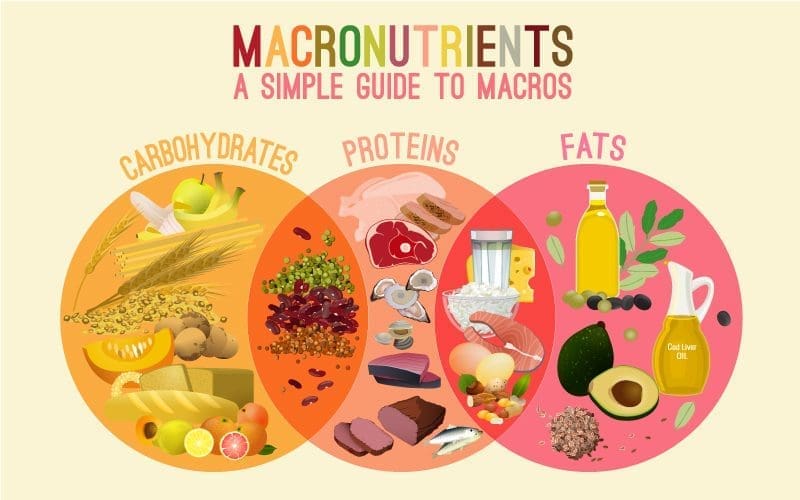Macronutrients Explained: Everything You Need to Know
Learn everything you need to know about macronutrients—protein, carbs, and fats—and how they impact your fitness goals. Discover the right balance to fuel muscle growth, boost energy, and improve overall health
NUTRITION FOR FITNESS
3/12/20253 min read


Introduction to Macronutrients
Macronutrients are the foundation of a healthy diet and play a critical role in fueling your body. They provide the energy needed for daily activities, support muscle growth, and regulate essential bodily functions.
The three primary macronutrients—protein, carbohydrates, and fats—each serve distinct purposes. Understanding their functions and balancing your intake can optimize fitness performance, enhance muscle growth, and improve overall health.
The Role of Protein in the Body
Protein is often referred to as the building block of life, and for a good reason. It is essential for muscle repair, growth, and maintaining a strong immune system.
Protein is composed of amino acids, which are categorized as essential (must be obtained from food) and non-essential (produced by the body). Sources of high-quality protein include lean meats, poultry, fish, eggs, dairy, legumes, and plant-based alternatives like tofu and quinoa.
For those engaged in strength training, consuming 1.2 to 2.2 grams of protein per kilogram of body weight is recommended to support muscle recovery and growth. Spreading protein intake evenly throughout the day ensures optimal absorption and utilization by the body.
Carbohydrates: The Body’s Primary Energy Source
Carbohydrates serve as the body's primary source of energy. When consumed, they are broken down into glucose, which fuels everything from brain function to intense workouts.
Carbs are categorized into simple carbohydrates (quickly digested sugars found in fruits and refined foods) and complex carbohydrates (slower-digesting sources like whole grains, vegetables, and legumes).
Consuming high-fiber carbohydrates helps regulate blood sugar levels, improve digestion, and sustain energy throughout the day. Those engaged in high-intensity workouts should prioritize complex carbs to fuel performance and aid recovery.
Understanding Fats and Their Role in Nutrition
Contrary to popular belief, dietary fat is not the enemy—in fact, it’s crucial for hormone production, brain function, and overall well-being. Fats are categorized into unsaturated fats (healthy fats found in avocados, nuts, and olive oil), saturated fats (found in animal products and certain oils), and trans fats (artificial fats that should be avoided).
Healthy fats help with the absorption of fat-soluble vitamins (A, D, E, K) and play a key role in cell function. Ideally, 20-35% of daily caloric intake should come from fats, focusing on unsaturated sources for optimal health benefits.
How Macronutrients Affect Fitness and Performance
Each macronutrient contributes differently to fitness and muscle-building goals:
Protein: Crucial for muscle repair and growth after strength training.
Carbohydrates: Essential for energy during high-intensity workouts and endurance training.
Fats: Provide long-lasting energy for lower-intensity activities and support recovery.
Understanding your fitness goal (muscle gain, fat loss, or maintenance) helps determine the ideal macronutrient breakdown. For muscle building, a higher protein and carbohydrate intake is ideal, while fat loss requires a slight calorie deficit with a well-balanced macronutrient approach.
The Importance of Macronutrient Timing
Timing your macronutrient intake can significantly impact performance and recovery. Pre-workout meals should contain a balance of protein and carbohydrates to provide sustained energy. Post-workout nutrition should focus on protein for muscle repair and carbs to replenish glycogen stores.
For overall health, maintaining consistent meal timing prevents energy crashes and optimizes nutrient absorption. Prioritizing whole, nutrient-dense foods ensures you’re fueling your body with high-quality macronutrients.
How to Calculate Your Macronutrient Needs
To determine your ideal macronutrient intake, consider your daily caloric needs, activity level, and fitness goals. Macronutrient distribution can vary based on individual needs, but common recommendations include:
Muscle gain: 40% carbs, 30% protein, 30% fats
Fat loss: 30% carbs, 40% protein, 30% fats
Maintenance: 50% carbs, 25% protein, 25% fats
Using macro calculators or fitness tracking apps like MyFitnessPal can help personalize your intake for optimal results.
Conclusion and Key Takeaways
Macronutrients are essential for overall health, fitness, and performance. Balancing protein, carbohydrates, and fats in your diet can help you reach your fitness goals, whether it’s muscle building, fat loss, or maintaining a healthy lifestyle. By understanding macronutrient roles, adjusting intake based on personal goals, and prioritizing high-quality food sources, you can optimize your health and performance.
Passionate insights on fitness and nutrition topics.
info@thestrongplate.com
© 2024. All rights reserved.


